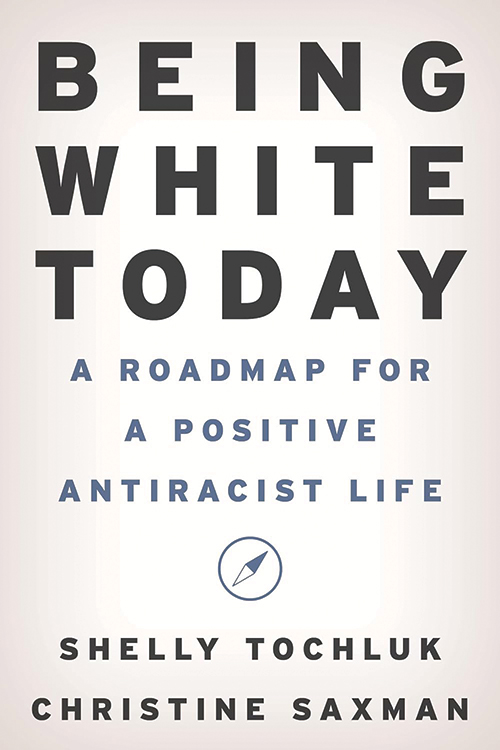
Being White Today: A Roadmap for a Positive Antiracist Life
Reviewed by Michael S. Glaser
February 1, 2024
By Shelly Tochluk and Christine Saxman. Rowman & Littlefield, 2023. 272 pages. $35/hardcover; $33.50/eBook.
Being White Today: A Roadmap for a Positive Antiracist Life takes a deep and very significant dive into exactly how complex it is to be White and antiracist. The lessons that may accrue from studying this work apply not only to being antiracist but also to effectively dealing with the many kinds of extremists whose attitudes and convictions differ significantly from our own.
As Bridget Moix, the general secretary of Friends Committee on National Legislation (FCNL), recently wrote in a report to FCNL members: “Our Quaker faith compels us to listen deeply, respectfully and in recognition of the inherent dignity and worth of every person, including those with whom we disagree.”
A core message in Being White Today is also very similar to what Quaker author Parker Palmer urges in his 2011 book, Healing the Heart of Democracy: we must practice making time to listen to each other’s stories if we are ever to be able to understand and meaningfully respond to people whose views are different from ours. Additionally, we must develop some profound awareness of how we are different from those whose ideas we would hope to change.
Being White Today explores the traps of White culture and offers various roadmaps to being antiracist in ways that forced me to realize how the challenge is much more complex and nuanced than I had realized or imagined: so much so that trying to summarize what I learned from reading the book is an overwhelming task. Even as I try to share some of the most important lessons, please know that my best review is to say that if you care about this topic—about understanding and entering into meaningful dialogue with those who do not see things as you do—this book is absolutely a must-read.
One of the major lessons that I gained was that I must become far more aware of the ways growing up comfortably White (and liberal) have blinded me to assumptions and expectations I held about myself and the culture in which I was raised and still live.
I also became far more aware than I had been of the many insidious ways the far right has honed its skills at attacking antiracist points of view with very logical-sounding arguments. Indeed, as the anti-critical race theory movement gains momentum in the United States, finding positive ways to be an antiracist becomes more and more complicated.
Perhaps the most significant (and widely applicable) teaching of the authors is their in-depth analysis of dangerous either/or mindsets and the importance of viewing things with a “both/and” perspective. The false equivalency that either/or thinking often creates obscures important truths about racism, cancel culture, and being accountable for our thoughts and actions.
The authors point out that too often “our socialized identities place us in an oppressor or oppressed position” that makes becoming an antiracist not simply a logical, intellectual choice. The need for careful self-exploration and self-understanding is large, especially if we hope to avoid over-generalizations and navigate opposing (and often seemingly contradictory) points of view with authenticity and integrity.
Shelly Tochluk and Christine Saxman have created a profoundly sensitive and complex exploration into one of the most difficult and essential concerns that confront good people in our culture today. Being White Today: A Roadmap for a Positive Antiracist Life is a book filled with practical, pragmatic, and strategic applications. I might caution that it is not an easy read, but I do want to stress that it is a book that I am deeply grateful to have read, and I urge others to take the time to read it with care.
Finally, my experience of reading Being White Today offered me ways to step up and show up similar to what Bridget Moix and others remind us of when they share this quote (often attributed to Rabbi Tarfon) about Micah 6:8 from Pirkei Avot: “Do not be daunted by the enormity of the world’s grief. Do justly, now. Love mercy, now. Walk humbly, now. You are not obligated to complete the work, but neither are you free to abandon it.”
A highly regarded professor and administrator at St. Mary’s College of Maryland for nearly 50 years, Michael S. Glaser is also a former board member of the Maryland Humanities Council and the Kirkridge Retreat and Study Center. He served as poet laureate of Maryland from 2004 to 2009.



Comments on Friendsjournal.org may be used in the Forum of the print magazine and may be edited for length and clarity.